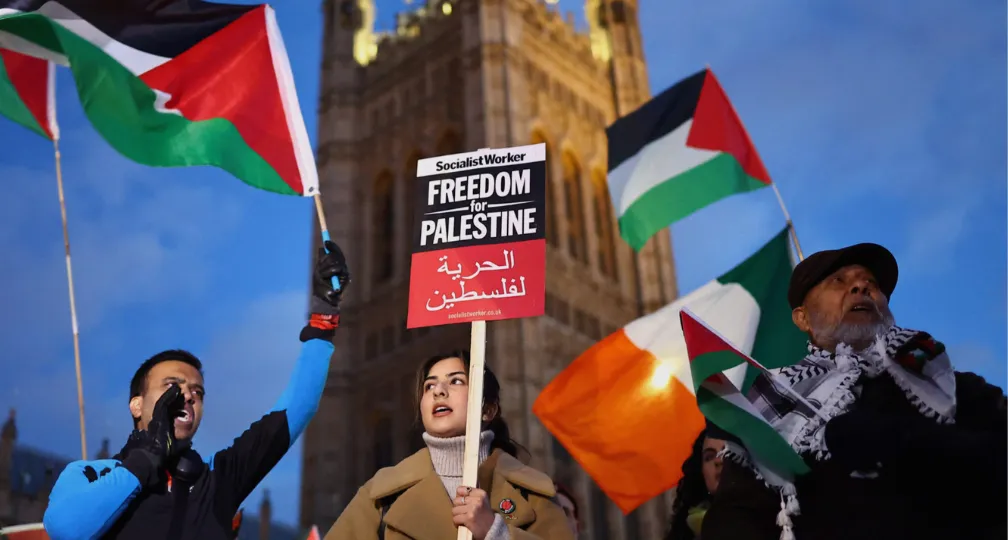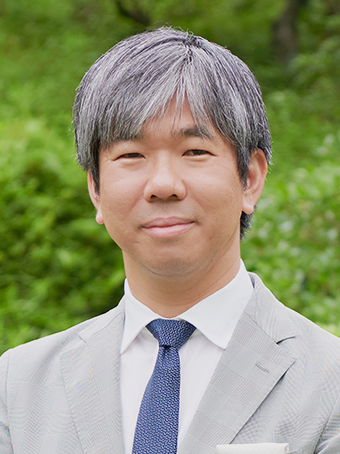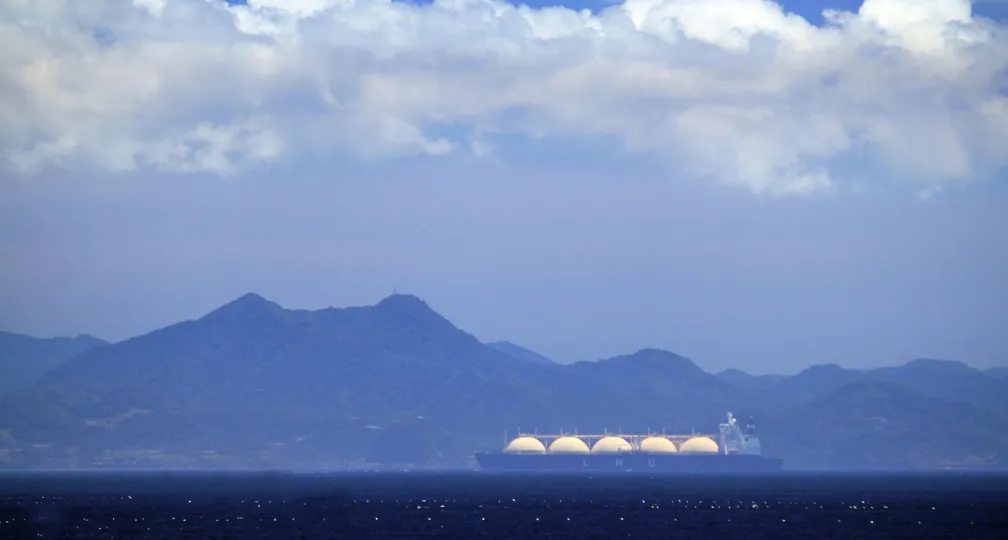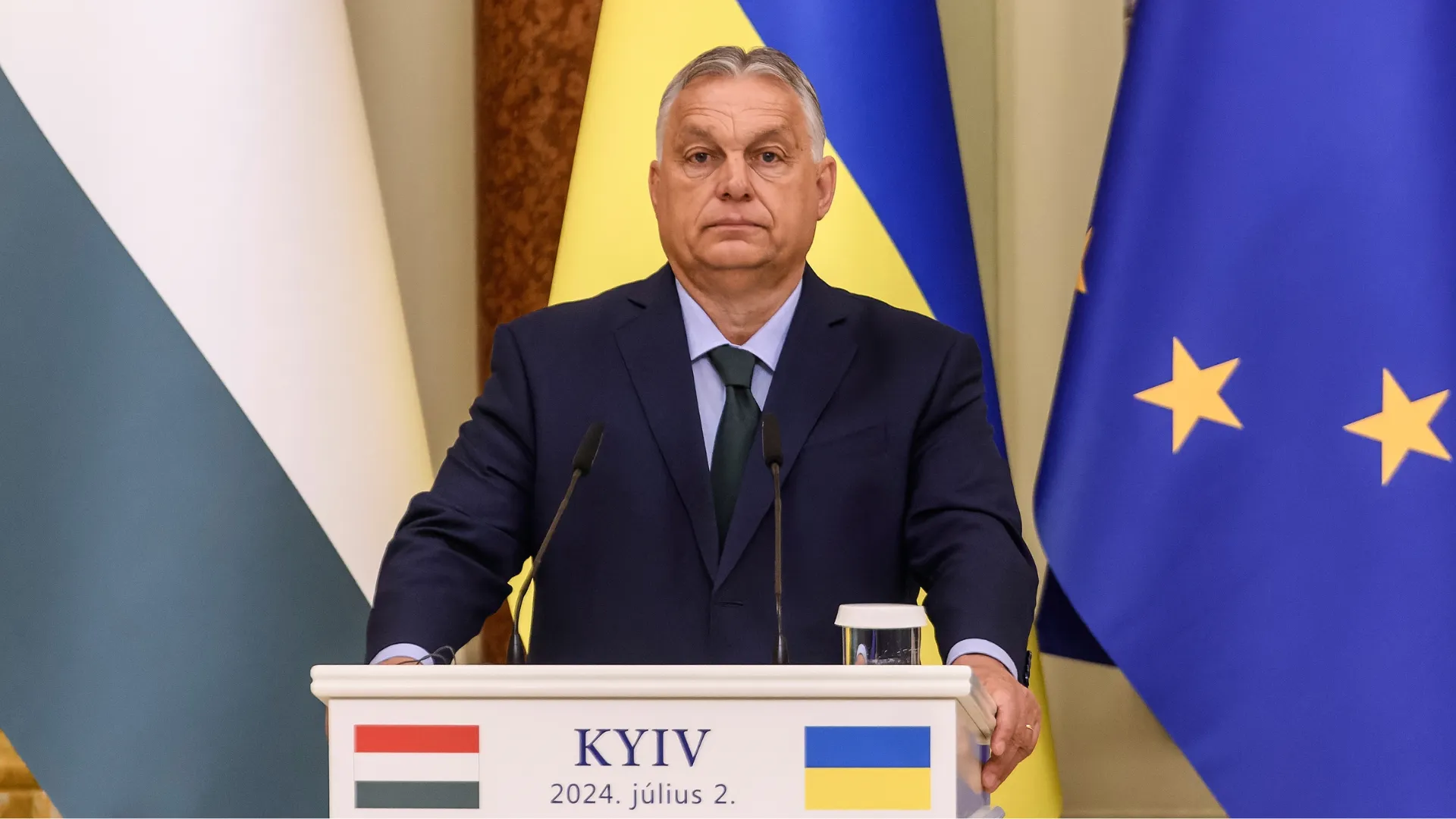Europe rattled by Israel-Hamas war

However, as people prayed for peace on Nov. 11 last year, brutal wars were going on in Europe and the Middle East — the Russia-Ukraine war and the Israel-Hamas war.
European countries’ attempts to establish a peaceful international order after two world wars have been greatly shaken.
On Nov. 11, a massive rally was held in London by some 300,000 pro-Palestinian demonstrators, according to police estimates, protesting against the Israeli military’s attacks on the Gaza Strip.
As some demonstrations held following the attacks turned radical, leading to violent confrontations, British Prime Minister Rishi Sunak called on people to refrain from taking such “provocative and disrespectful” actions on Remembrance Day, when a number of peace memorials would be held across the country.
In 1922, the League of Nations awarded Britain an international mandate to administer Palestine, and following the outbreak of the first Arab-Israeli war in 1948, many Palestinians fled to the U.K.
The U.K. is not irrelevant to the current chaos.
On the other hand, many Jews live in the U.K., and Zionism — the Jewish nationalist movement to revive Israeli culture — has historically taken root in the country as well.
In the U.K., confrontations between Israelis and Palestinians tend to grow into a domestic political issue.
Huge demonstrations against the Israeli military’s attacks on Gaza have been taking place not only in London but around the world.
In Japan, such protest rallies were held in Tokyo’s Shibuya and Harajuku districts on Nov. 10, with around 4,000 people taking part, according to organizers.
There are as many voices criticizing the Israelis for conducting military attacks on Gaza as those calling for solidarity with the Israeli people victimized by Hamas attacks.
In such circumstances, what are the stances shown by European countries?
Solidarity turning to concerns
After Hamas launched indiscriminate attacks killing Israeli civilians on Oct. 7, European leaders condemned the brutality of the raids.
European Commission President Ursula von der Leyen visited Israel the following week on Oct. 13. “I have arrived in Israel with the president of the European Parliament to express our solidarity with the Israeli people in the wake of the horrific Hamas terrorist attack,” she wrote on the social networking site X.
“This is the most heinous assault against Jews since the Holocaust,” she said in her joint statement with Israeli Prime Minister Benjamin Netanyahu.
German Chancellor Olaf Scholz also visited Israel and said, “Germany’s history and the responsibility it had for the Holocaust requires us to help maintain the security and existence of Israel.”
Italian Foreign Minister Antonio Tajani, who traveled to Israel, wrote on X that Hamas “is like ISIS (Islamic State of Iraq and Syria), it kills like the Nazis.”
When Israel launched military attacks on Gaza, voices expressing solidarity with Israel and condemning Hamas attacks were heard in many European countries.
However, when von der Leyen made her visit to Israel, there was already criticism over the move.
There was concern and criticism over remarks and actions made by the European Commission president who, in consideration for the complicated relations between Israel and Gaza, visited Israel without prior consultations within the European Union and took a one-sided stance of supporting the country.
Particularly after it was reported that the Israeli government was cutting water and fuel supplies to Gaza, some European countries, including Ireland, and even the United Nations, began claiming that such actions were a grave concern for humanitarian reasons.
The ongoing war in the Middle East cannot be interpreted simply as a conflict between good and evil.
European countries’ support for Israel gradually declined with the spread of humanitarian damage imposed on Gaza by Israel’s military attacks.
According to an article by BBC international editor Jeremy Bowen published on Nov. 3, titled “Five new realities after four weeks of Israel-Gaza war,” the number of Palestinian deaths released by Gaza’s health ministry, run by Hamas, had at that point exceeded 9,000, of whom around 65% were children and women.
It is difficult to verify the accuracy of the figures, but many organizations have given similar numbers.
On Nov. 7, exactly a month after Hamas launched its attacks on Israel, the Israeli military expanded ground operations in Gaza and the number of civilian fatalities rose even more sharply.
As videos of the attacks were broadcast all over the world, criticisms and calls for a cease-fire grew in various countries.
Meanwhile, many Israeli hostages continue to be held in Hamas captivity as “human shields,” although dozens have been freed.
While Russia’s invasion of Ukraine led to international solidarity with Ukraine rather explicitly, support for Israel, which continues to attack Gaza, has not expanded beyond a certain point. Instead, voices are growing among people in European countries criticizing their own governments for failing to condemn Israel strongly enough.
Are they ‘terrorists’?
There are growing doubts within Europe over how to describe Hamas, which conducted armed attacks on Israel.
People in the U.K. are divided over whether Hamas should be called “terrorists” or not.
John Simpson, BBC world affairs editor, explained the reason why the broadcaster doesn’t say that Hamas gunmen are terrorists, saying “calling someone a terrorist means you’re taking sides.”
On the other hand, U.K. Defence Secretary Grant Shapps said Hamas fighters “are not freedom fighters, they are not militants, they are pure and simple terrorists and it’s remarkable to go to the BBC website and still see them talking about gunmen and militants and not calling them terrorists.”
In the U.K., both the ruling Conservative Party and the opposition Labour Party share the same stance of referring to Hamas as terrorists.
Sunak, during his visit to Israel on Oct. 19, described Hamas attacks as “an unspeakable, horrific act of terrorism.”
Not all media organizations in the U.K. adopt a policy similar to BBC.
There are British media organizations such as broadcaster ITV that do call Hamas terrorists.
Such a divide within the country over how to describe Hamas indicates the fact that the nature of this war is elusive and extremely difficult to understand.
For instance, it is difficult to define clearly what Hamas is. It is neither a sovereign state nor a member state of the United Nations.
Although Israel and Palestine signed the Oslo Accord in 1993 to shape a two-state solution, it has been difficult to achieve that.
The boundary between good and evil in this war is fuzzy, and as Israel’s attacks on Gaza intensify, it is becoming increasingly difficult for the international community to stand in solidarity with Israel.
It is hard to give a simple, clear answer to the question of whether Hamas is a terrorist group or not, and whether Israel is the perpetrator or the victim.
In the initial stage of the conflict, many European countries tended to see Hamas, which conducted armed attacks, as evil and Israel, which was attacked, as good. But such a stance was gradually adjusted.
The Japanese government, on the other hand, took a cautious approach at first and refrained from calling the Hamas attacks terrorism. Then Tokyo changed its wording to keep pace with other Western countries.
On Oct. 27, an emergency session of the United Nations General Assembly adopted a Jordanian resolution calling for a humanitarian truce in Gaza. But the stance on the resolution differed even among the Group of Seven countries, reflecting the elusiveness of the nature of the war.
Japan abstained from the vote along with the U.K. and Germany. The United States, together with Israel, voted against the resolution which would mean Israel halting its attacks.
On the other hand, France and Spain voted in favor of the resolution, as did China, Russia and Iran.
France, the U.S. and the U.K. — the three Western countries that are permanent members of the U.N. Security Council — have each taken a separate stance on the issue. The situation is very different from their response to the war in Ukraine.
Russia, a permanent member of the U.N. Security Council, is greatly disturbing the international order based on the rule of law with its invasion of its neighbor Ukraine, which is illegal under international law.
As for the Israel-Hamas war, criticism is growing in the international community over the fact that the 1993 Oslo agreement has not progressed, leaving Palestinians in Gaza in difficult conditions. The two-state solution has hit a deadlock.
The optimistic outlook for the future seen in Europe and the Middle East in the 1990s following the end of the Cold War has now largely been lost, and disastrous wars are shaking up the international order.
Some countries of the so-called Global South showed a significant presence in the vote held at an emergency session of the U.N. General Assembly right after Russia’s aggression started, by keeping their distance from Moscow and Kyiv and their respective allies.
Apparently annoyed by Western countries’ limited ability to solve problems, some Global South nations are moving to play a more proactive role.
The Japanese government often uses the term “balanced diplomacy,” but its basic stance on what principles and values it should protect to achieve this policy is unclear.
In an era when the international order is being greatly disrupted and justice upheld by Western countries is facing great difficulties, Japan is tasked with an important mission to coordinate among varying interests and uphold a free and open international order that includes diverse values.
How Japan responds to the Israel-Hamas war will serve as an important touchstone.
[Note] This article was posted to the Japan Times on January 9, 2024:
https://www.japantimes.co.jp/commentary/2024/01/09/world/europe-israel-hamas-war/
(Photo Credit: AFP / Aflo)

Geoeconomic Briefing
Geoeconomic Briefing is a series featuring researchers at the IOG focused on Japan’s challenges in that field. It also provides analyses of the state of the world and trade risks, as well as technological and industrial structures (Editor-in-chief: Dr. Kazuto Suzuki, Director, Institute of Geoeconomics (IOG); Professor, The University of Tokyo).
Disclaimer: The opinions expressed in Geoeconomic Briefing do not necessarily reflect those of the International House of Japan, Asia Pacific Initiative (API), the Institute of Geoeconomics (IOG) or any other organizations to which the author belongs.

Director, International House of Japan

Group Head, Europe & Americas,
Director of Research, Asia Pacific Initiative
Director, International House of Japan
Yuichi Hosoya is professor of international politics at Keio University, Tokyo. Professor Hosoya was a member of the Advisory Board at Japan’s National Security Council (NSC) (2014-2016). He was also a member of Prime Minister’s Advisory Panel on Reconstruction of the Legal Basis for Security (2013-14), and Prime Minister’s Advisory Panel on National Security and Defense Capabilities (2013). Professor Hosoya studied international politics at Rikkyo (BA), Birmingham (MIS), and Keio (Ph.D.). He was a visiting professor and Japan Chair (2009–2010) at Sciences-Po in Paris (Institut d’Études Politiques) and a visiting fellow (Fulbright Fellow, 2008–2009) at Princeton University. [Concurrent Position] Professor, Faculty of Law, Keio University
View Profile-
 Japan’s Sea Lanes and U.S. LNG: Towards Diversification and Stabilization of the Maritime Transportation Routes2026.02.24
Japan’s Sea Lanes and U.S. LNG: Towards Diversification and Stabilization of the Maritime Transportation Routes2026.02.24 -
 Fed-Treasury Coordination as Economic Security Policy2026.02.13
Fed-Treasury Coordination as Economic Security Policy2026.02.13 -
 What Takaichi’s Snap Election Landslide Means for Japan’s Defense and Fiscal Policy2026.02.13
What Takaichi’s Snap Election Landslide Means for Japan’s Defense and Fiscal Policy2026.02.13 -
 Challenges for Japan During the U.S.-China ‘Truce’2026.02.12
Challenges for Japan During the U.S.-China ‘Truce’2026.02.12 -
 India and EU Sign Mother of All Deals2026.02.09
India and EU Sign Mother of All Deals2026.02.09
 Orbán in the Public Eye: Anti-Ukraine Argument for Delegitimising Brussels2026.02.04
Orbán in the Public Eye: Anti-Ukraine Argument for Delegitimising Brussels2026.02.04 Fed-Treasury Coordination as Economic Security Policy2026.02.13
Fed-Treasury Coordination as Economic Security Policy2026.02.13 When Is a Tariff Threat Not a Tariff Threat?2026.01.29
When Is a Tariff Threat Not a Tariff Threat?2026.01.29 Oil, Debt, and Dollars: The Geoeconomics of Venezuela2026.01.07
Oil, Debt, and Dollars: The Geoeconomics of Venezuela2026.01.07 India and EU Sign Mother of All Deals2026.02.09
India and EU Sign Mother of All Deals2026.02.09












